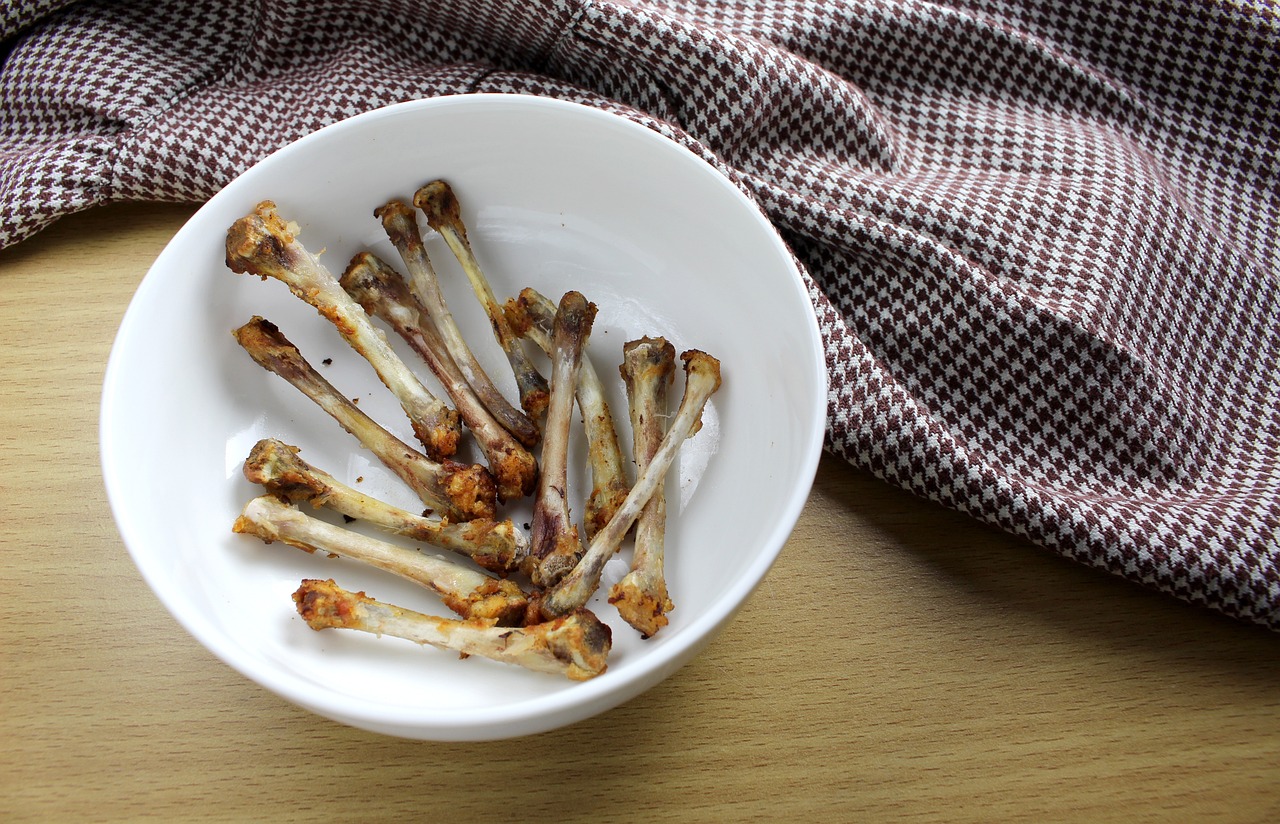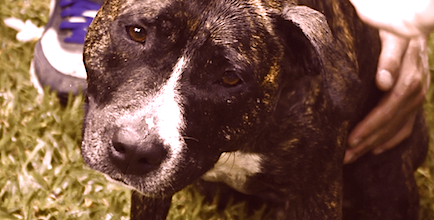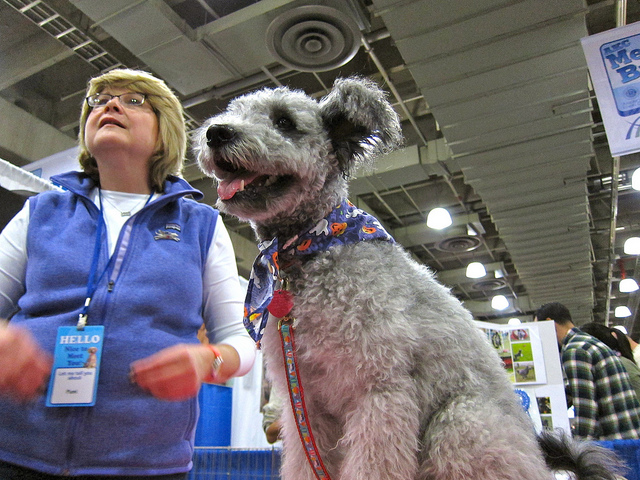Can Dogs Eat Chicken Bones? A Comprehensive Guide
Contrary to popular belief, some bones are not a good idea for dogs, leading many to ask: Can dogs eat chicken bones? Here’s what you need to know.

- No, dogs should never eat cooked chicken bones, as they can splinter and cause choking, blockages, or internal injuries.
- Even a single bone can be dangerous, so it’s best to avoid them entirely and opt for safer chew alternatives.
- If your dog eats a chicken bone, monitor for distress and contact a veterinarian immediately for guidance.
The question of “can dogs eat chicken bones?” has been a topic of debate among pet owners for a long time. While some argue that dogs have been consuming bones for centuries, others caution against the risks associated with feeding chicken bones, specifically, to dogs. This article delves into the risks of feeding chicken bones to dogs, the types of chicken bones to avoid, and safer alternatives for dogs who enjoy chewing bones.

Don’t leave your pet’s safety to chance
Sign up for Petful recall alerts today.

Why Are Chicken Bones Dangerous For Dogs?
Cooked chicken bones pose significant risks to dogs due to their tendency to splinter and the possible choking hazard they pose. When chewed, these bones can break into sharp fragments that can cause serious internal injuries, including:
- Choking Hazard: Small bones or bone fragments can get lodged in the throat, leading to choking.
- Gastrointestinal Obstructions: Larger bone fragments can obstruct the gastrointestinal tract, requiring surgical removal.
- Perforations: Sharp bone fragments can puncture the stomach or intestinal lining, leading to peritonitis which is a medical emergency.
Veterinarians often caution against feeding dogs chicken bones, especially those that are cooked, because of these risks.
How Many Chicken Bones Can Dogs Eat Before Getting Sick?
Given the potential dangers associated with dogs eating chicken bones, it is hard to define a “safe” amount. Even one bone can pose a choking hazard for dogs, as it could crack apart and the splintered bone could damage their stomach, intestinal tract, or other internal organs. Thus, it is best to avoid giving chicken bones to dogs, even small amounts, because of the possible dangers associated with them. Instead, offering them dog safe alternatives is a better choice.
Safer Alternatives
For pet owners who want to provide their pup with the benefits of chewing bones, there are safer alternatives to chicken bones:
- Specially designed chew toys: These can satisfy a dog’s natural desire to chew without the risks associated with bone fragments.
- Synthetic bones and dental chews: These products are designed to be safe for dogs to chew and can also help maintain a dog’s teeth.
- Natural chews: Options like bully sticks, tendons, or rawhide alternatives (like those made from fish skin) can be safer than bones, provided they are sourced from reputable brands and used under supervision.

What if My Dog Already Ate Chicken Bones?
If a dog has already eaten chicken bones, it’s important to take immediate and appropriate action to prevent potential complications. Here are some tips on what to do:
- Don’t Panic: Stay calm to think clearly and act swiftly. Being composed will help you handle the situation effectively.
- Monitor Your Dog: Observe your dog closely for any signs of distress, such as choking, gagging, drooling excessively, pawing at the mouth, coughing, difficulty breathing, or attempting to vomit.
- Check for Obstructions: If you can safely look into your dog’s mouth and see a bone lodged in the throat, and you can easily remove it without getting bitten or causing harm, carefully do so. If it’s not easily reachable or if doing so could harm your dog or you, do not attempt to remove it.
- Contact Your Veterinarian Immediately: Whether your dog is showing symptoms or not, it’s crucial to get in touch with your vet or an emergency veterinary clinic. They can advise you on the immediate steps to take and may recommend bringing your dog in for an examination.
- Observe for Gastrointestinal Issues: Even if your dog seems fine at first, watch for signs of internal blockage or injury over the next few days. Symptoms may include vomiting, diarrhea, lethargy, abdominal pain, or behavior changes.
- Maintain a Bland Diet: Your vet may recommend feeding your dog a bland diet to help ease its digestive system. This could consist of boiled chicken (without bones) and rice or a special diet.
- Avoid Inducing Vomiting: Do not try to make your dog vomit unless specifically instructed by a veterinarian, as this could cause more harm, especially if bone fragments are sharp.
- Follow Up: Ensure follow-up visits to the vet to monitor your dog’s health and to confirm that there are no lingering issues from the ingested bones.
- Prevent Future Incidents: Take preventive measures to ensure your dog does not have access to chicken bones in the future.
Immediate action and close monitoring are key to managing the situation where a dog has ingested chicken bones, minimizing the risk of potential complications.
In sum, while dogs may have a history of chewing bones, the risks associated with feeding chicken bones, particularly cooked ones, are significant. Pet owners should prioritize safety and consider safer alternatives to fulfill their dogs’ chewing instincts. Consulting with a veterinarian can provide guidance tailored to an individual dog’s health needs and dietary requirements, ensuring that they receive the benefits of chewing without the associated risks.
Frequently Asked Questions (FAQ)
Can Dogs Eat Chicken Bones Raw?
Raw chicken bones are softer and less likely to splinter than cooked ones, leading some pet owners to consider them a safer option. However, feeding raw bones comes with its own set of risks, including potential exposure to bacteria like Salmonella. It’s best to avoid feeding them chicken bones completely.
Can Dogs Eat Chicken Bones Cooked?
No, dogs should not eat cooked chicken bones because cooking them makes them harden and thus more of a choking hazard. Additionally, the pieces can splinter and crack which could then harm a dog’s intestines, throat, or stomach.
What Type of Bones Can Dogs Eat?
While bones may seem like a given treat for dogs to gnaw on, there are actually a lot of risks associated with them and certainly many precautions to take. Risk of choking, teeth chipping, or bones splintering and thus harming a dog’s internal organs are just a few of the reasons why it is important to check with a vet before offering your dog a bone. They can offer some advice on the best option for your specific pup and give you tips on how to safely offer them certain bones if you decide to do so.
Can You Give Dogs Chicken Drumsticks?
It is not a good idea to feed drumsticks to a dog because they can be a choking hazard for pups. Opt for dog safe chew toys or other, safer alternatives instead.
How Long After Eating a Chicken Bone Would a Dog Get Sick?
The symptoms and issues associated with dog eating chicken bones can vary and depend on different factors. In general, if your dog ate a chicken bone and isn’t showing any immediate or severe symptoms, it is still recommended to contact a vet to analyze the best course of action. Monitoring your dog in the days following the incident is a good idea to check for any changes in behavior or signs of distress.
Can Dogs Eat Rib Bones?
It’s not a good idea for dogs to eat rib bones because they pose a lot of the same risks. They can splinter, choke, and cause internal injuries.
Curious about what other foods dogs can eat? Check out these related articles below:







